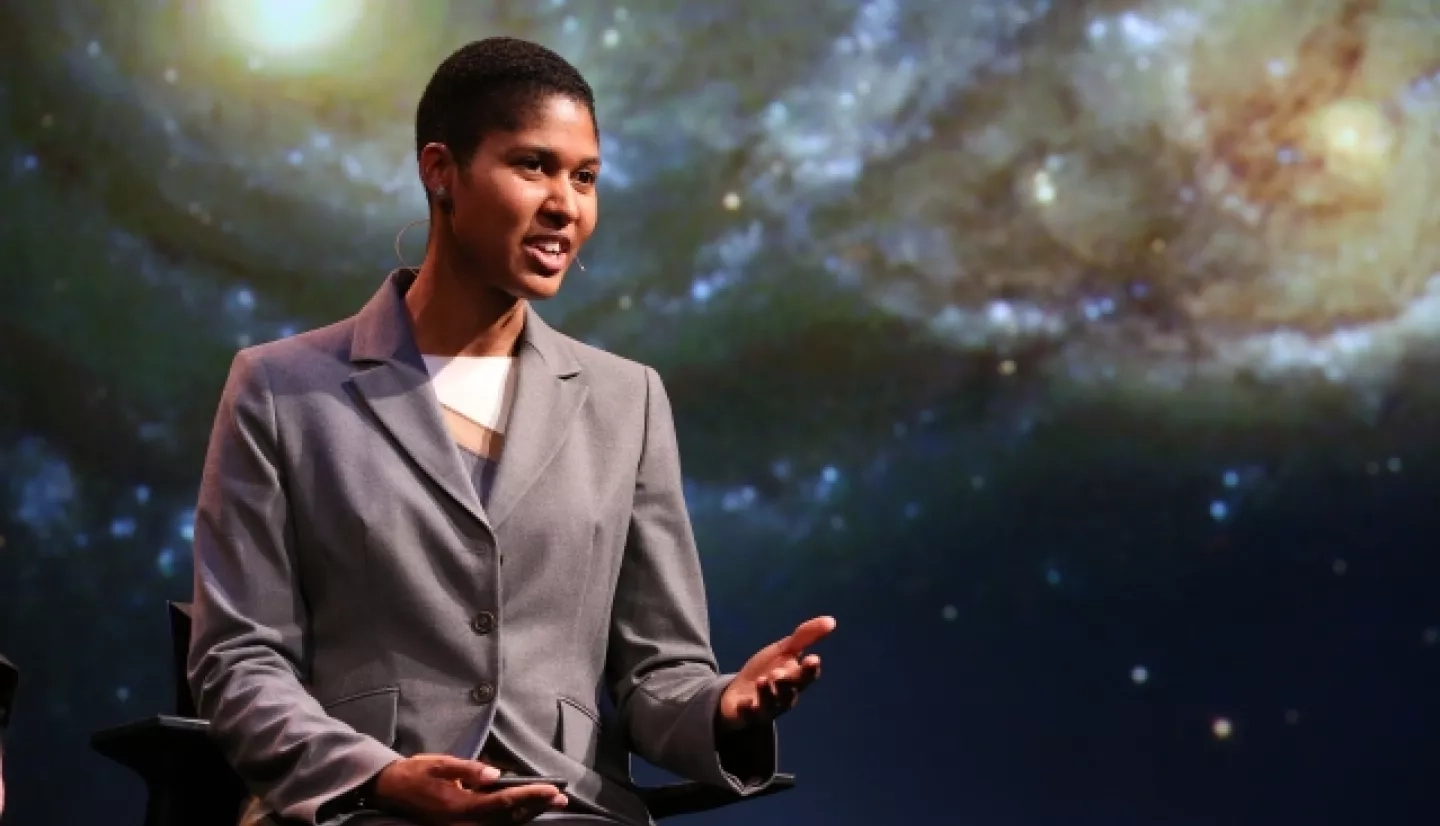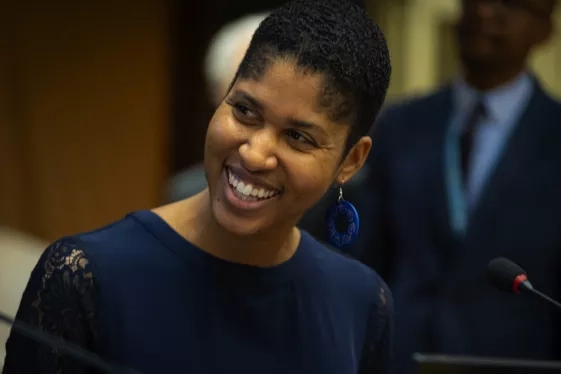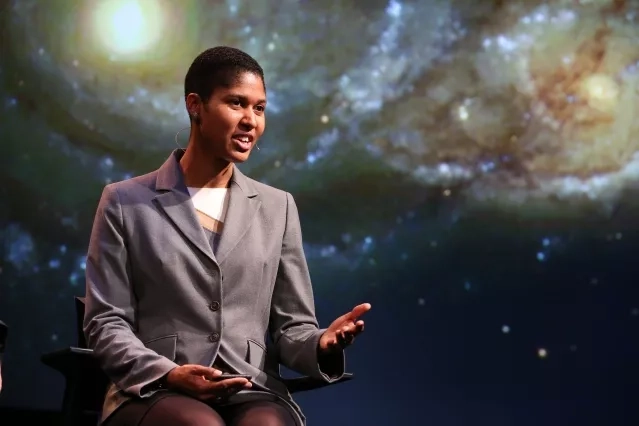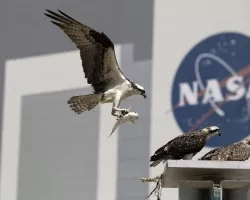Danielle Wood grew up in Florida's "Space Coast," where her mother, a schoolteacher, would stop classes and take them outside to watch rocket launches at nearby Cape Canaveral.
Now she's leading the way in bringing space technology down to Earth.
Wood is the founder of Space Enabled, a research group at MIT Media Lab in Boston, Massachusetts. Its goal is to make it easier and more affordable for people around the world to make use of space-enabled technology and data. Wood said, "Even if data is free, the technology and education to interpret it is not."
for Development in Switzerland. Credits: UNCTAD/Tim Sullivan CC BY 2.0
Space Enabled collaborates with national and local governments, non-profits and entrepreneurial firms to identify opportunities to apply space technology in their work to improve public services and solve local challenges. This includes working with NASA on fostering international collaboration across industry and expertise to advance the United Nations's Sustainable Development Goals.
Examples of Space Enabled’s projects include a collaboration in Ghana with local scientists and leaders to combat environmental degradation from illegal gold mining, and another in Benin, to use remote sensing to improve management of threatened forests. Both projects are supported by grants from NASA Earth Applied Sciences's Ecological Forecasting program area.
"We couldn't do it without NASA's support and funding," Wood said, "and without the request and invitation from both countries."
Wood says that even though she grew up in the shadow of NASA’s Kennedy Space Center, she did not expect to work with NASA.
"My mother appreciated the efforts of our national space program," Wood said. "When I was in primary school, my mother was my teacher and we often took breaks from class to watch NASA launches outside our school, celebrating our country and the scientific strides of NASA." Wood was planning on pursuing architecture as a career path – until she was 17, and a high school teacher encouraged her to apply for a summer research internship at NASA’s Kennedy Space Center in Florida.
That summer of 1999, Wood worked on a team for International Space Station logistics. She saw how components of spacecraft built around the world came together before launching to the Space Station via the Space Shuttle. It was there she met her mentor, Dorothea Kuzma, a NASA logistics engineer who worked on the Space Station and Space Shuttle teams. Kuzma encouraged Wood to dream big.
"Dorothea, and women like [astronauts] Eileen Collins and Cady [Catherine] Coleman, who were in that launch of the Chandra X-Ray telescope, were taking a leadership role in space science. It inspired me to pursue a career in aerospace engineering," Wood said.
Wood pursued an undergraduate degree in aerospace engineering at the Massachusetts Institute of Technology (MIT), but was drawn to global issues affecting women around the world. So while her classes focused on space theory and equations, Wood was invited by a fellow MIT student to spend part of the summer volunteering at a school in Kenya where sponsors supported girls to pursue an education. While spending time in Kenya, Wood further explored her passion to support the needs of women from around the world to have opportunities to pursue education and a high quality of life.
"For a long time, I thought of working on space and justice as separate entities," Wood said. "Improving the lives of women was something I thought I'd have to do on my own time."
Everything changed when she heard Dan Irwin talk about SERVIR, a program he founded within the Applied Sciences Capacity Building program area. SERVIR, a joint initiative between NASA and the U.S. Agency for International Development (USAID), applies Earth observations, models and mapping to help inform environmental decision-making in Asia, Africa and the Americas. "Dan's enthusiasm for his work was apparent – he wanted to help people,” Wood said. “So did I."
The admiration was mutual. "Danielle shared SERVIR’s mission from the start – and her work since then has really embodied those values," Irwin said. "I think she was surprised to see a whole community of people around the world who shared those goals of applying Earth observations to advance development outcomes."
Wood interned with NASA SERVIR in 2005 before pursuing her master’s degrees and later a PhD in engineering systems at MIT. "My training as an aerospace engineer was different from most Earth scientists'," Wood said. "As engineers, we learned how to design the mission to collect the data, not use it. But through SERVIR, I learned how countries in Latin America and Asia were making progress in their space capabilities and could use data from NASA satellites to address environmental and social issues" like deforestation, water quality and food security.
She joined the Johns Hopkins University Applied Physics Laboratory as a postdoctoral fellow in 2013 and later worked as a Space Systems engineer at The Aerospace Corporation. She then returned to NASA in 2015 to work as the special assistant to Deputy Administrator Dava Newman and provide technical advice on space exploration, education and innovation. In 2017, Wood found an opportunity to work on building a bridge between science and justice, as the Applied Sciences manager at NASA's Goddard Space Flight Center in Greenbelt, Maryland.
Wood said her international work with SERVIR opened her eyes to human rights issues. "I felt so much anger at the injustice women of color or low-income communities face around the world," Wood said. "After all those years, NASA Applied Sciences was the link [on taking action]."
At Goddard, Wood worked with decision makers who were hoping to use space-based data on more grounded issues, like water quality, food security and disaster response. She also helped support scientists who wanted to work with decision makers to find specific types of data or design a NASA mission to acquire it.
Now at Space Enabled, Wood continues to make connections. She leads a team of graduate and professional researchers who help develop a variety of space enabled technologies. Wood and her team are also pursuing projects to apply satellite-based Earth observations to support decision making in Brazil, Benin, Ghana, Tanzania and India.
"Danielle's talent and dedication to using Earth observations to advance justice worldwide makes her an inspiration to all of us," said Lawrence Friedl, director of NASA's Earth Applied Sciences Program.
In October 2019, Wood was inducted into the International Academy of Astronautics for her cutting edge work on the relationship between space science, Earth observations and justice.
"Space belongs to all countries," Wood said. “Every country deserves equal opportunities to pursue scientific achievement for societal benefit." Thanks to Wood's work, the scientific community is getting closer to that goal.





